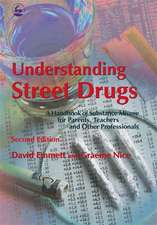Rethinking Our War on Drugs: Candid Talk about Controversial Issues
Autor Gary L. Fisheren Limba Engleză Hardback – 29 sep 2006 – vârsta până la 17 ani
Preț: 287.46 lei
Preț vechi: 349.61 lei
-18% Nou
Puncte Express: 431
Preț estimativ în valută:
55.01€ • 57.22$ • 45.42£
55.01€ • 57.22$ • 45.42£
Carte tipărită la comandă
Livrare economică 14-28 aprilie
Preluare comenzi: 021 569.72.76
Specificații
ISBN-13: 9780275990268
ISBN-10: 0275990265
Pagini: 228
Dimensiuni: 156 x 235 x 23 mm
Greutate: 0.49 kg
Ediția:New.
Editura: Bloomsbury Publishing
Colecția Praeger
Locul publicării:New York, United States
ISBN-10: 0275990265
Pagini: 228
Dimensiuni: 156 x 235 x 23 mm
Greutate: 0.49 kg
Ediția:New.
Editura: Bloomsbury Publishing
Colecția Praeger
Locul publicării:New York, United States
Notă biografică
Gary L. Fisher is Founder and was the first Director at the Center for the Application of Substance Abuse Technologies at the University of Nevada, Reno. A former Professor of Counseling and Educational Psychology, he is the author of a textbook on substance abuse counseling that is now in its third edition. Fisher's career has spanned 31 years and includes work as a private practice clinician and in public schools as a psychologist. The center he directed in Reno provides drug and alcohol counselors and prevention specialists with state-of-the-art training.
Cuprins
Foreword by William L. WhitePrefaceOne The War on Drugs: Is the Battle Plan Working?Two The National Drug Control Strategy, 1996-2005Three Legalization, Decriminalization, Harm ReductionFour How Dangerous Is Marijuana?Five Why Doesn't the NDCS Focus on Underage Drinking?Six Does Prevention Work?Seven Controversial Issues in TreatmentEight Can the Supply Ever Be Stopped?Nine A New Model for a National Drug Control PolicyNotesIndex
Recenzii
Offering a comprehensive presentation of relevant data, Fisher details past and current failures of the US's National Drug Control Strategy (NDCS). His most convincing and important contention is that the emphasis on reducing marijuana use among youth is misguided. Youth alcohol consumption, argues Fisher, causes far more harm than marijuana use, and alcohol is most often the gateway drug to other drugs and hence to drug problems. In a discussion that echoes criticism of big tobacco, the author exposes the alcohol industry's efforts to attract young drinkers to replace drinkers who are aging or dead, and he points to evidence that the NDCS--and the nation's laws regarding drug use, including alcohol--is heavily influenced by lobbying from alcohol interests. As a result, objective evidence that conflicts with alcohol interests is dismissed. This is a fascinating book..Essential. All readers; all levels.
He approaches his topic, the critical review of the National Drug Control Strategies, with an organized, well-developed case based on published data. Fisher dismantles the strategies implemented for the last decade in minute detail, and leaves the reader with a picture of a government throwing enormous amounts of money at drug control strategies that, at their best, are demonstrated to be only adequate or passable when outcome measures are applied..[a] quick and informative read for anyone interested in substance abuse and intervention strategies in the United States. The author's presentation of data points unerringly to the failure of the drug control strategies that we have invested in so heavily since 1996. A change is clearly called for, and Fisher makes a compelling case for such a change.
In this accessible text Fisher critically examines the National Drug Control Strategy (NDCS) of the past ten years and observes that it has failed to reduce either the supply of drugs or the demand for them in the U.S. He then considers in turn a number of controversial issues such as the legalization of marijuana and the disease concept of addiction. He concludes by proposing a new model for an NDCS that is based on harm management.
He approaches his topic, the critical review of the National Drug Control Strategies, with an organized, well-developed case based on published data. Fisher dismantles the strategies implemented for the last decade in minute detail, and leaves the reader with a picture of a government throwing enormous amounts of money at drug control strategies that, at their best, are demonstrated to be only adequate or passable when outcome measures are applied..[a] quick and informative read for anyone interested in substance abuse and intervention strategies in the United States. The author's presentation of data points unerringly to the failure of the drug control strategies that we have invested in so heavily since 1996. A change is clearly called for, and Fisher makes a compelling case for such a change.
In this accessible text Fisher critically examines the National Drug Control Strategy (NDCS) of the past ten years and observes that it has failed to reduce either the supply of drugs or the demand for them in the U.S. He then considers in turn a number of controversial issues such as the legalization of marijuana and the disease concept of addiction. He concludes by proposing a new model for an NDCS that is based on harm management.












